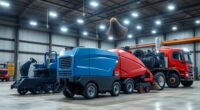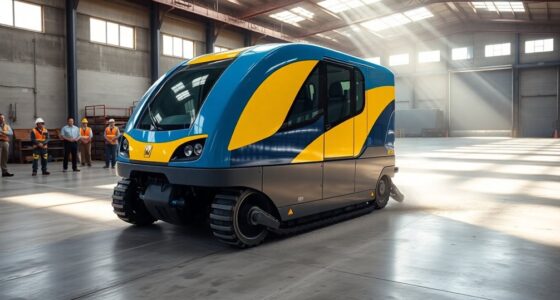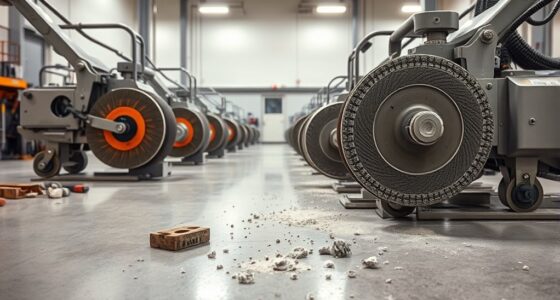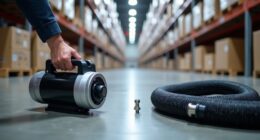Industrial sweeper machines not only clean effectively but also promote a greener planet. With adjustable water flow and energy-saving technologies, they boost efficiency while cutting your water and energy use. They operate with minimal chemicals, improving eco-friendly practices. Plus, advanced filtration systems enhance indoor air quality, benefiting your health. The long-term savings on operational costs make them a smart investment. Discover how these machines contribute to sustainability and elevate your cleaning routine.
Key Takeaways
- Industrial sweepers enhance water efficiency through adjustable flow settings, significantly reducing water waste while maintaining effective cleaning.
- By minimizing the use of harmful chemicals, modern sweepers support environmentally friendly practices and promote corporate social responsibility.
- Advanced filtration systems in sweepers capture dust and allergens, improving indoor air quality and promoting healthier work environments.
- Energy-efficient designs lower operational costs and carbon emissions, contributing to long-term sustainability and reduced environmental impact.
- The durability and recyclability of industrial sweepers minimize waste, supporting responsible disposal and promoting a greener planet.
Enhanced Water and Energy Efficiency

As you consider the environmental impact of industrial cleaning, you'll find that modern sweepers are leading the way in enhanced water and energy efficiency.
These machines utilize adjustable water flow settings, which greatly reduce water usage while maintaining effective cleaning. Advanced energy-saving technologies, like variable-speed motors, further boost energy efficiency by minimizing consumption during idle times.
Battery-powered models decrease reliance on fossil fuels, helping lower carbon emissions and promoting sustainable practices. Additionally, recycling systems in these sweepers allow for water reuse, minimizing waste and enhancing resource conservation. Furthermore, the integration of energy-efficient systems can lead to a decrease in overall energy demand.
Reduction of Harmful Chemicals
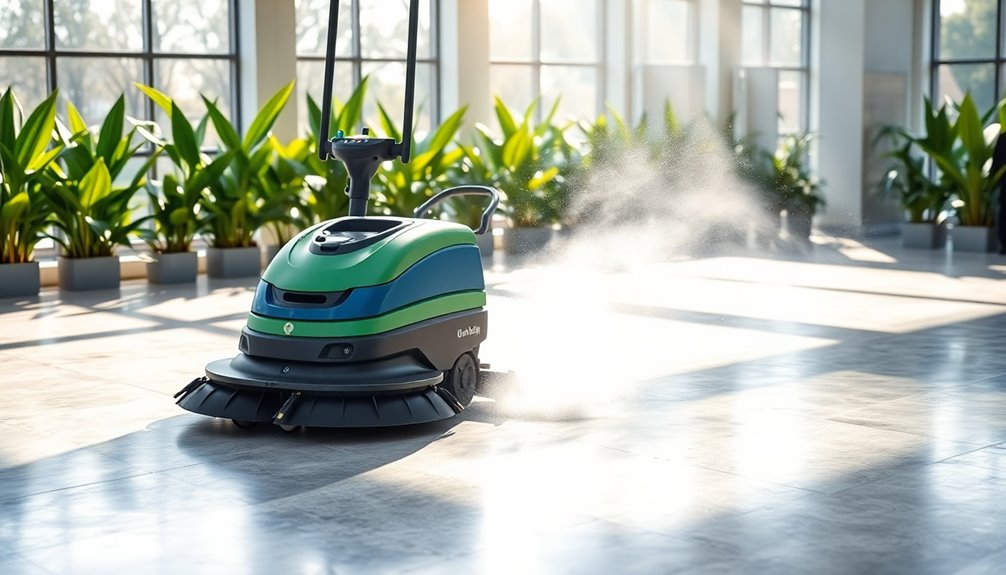
While many traditional cleaning methods rely heavily on harmful chemicals, modern industrial sweepers are changing the game by operating effectively with minimal or no cleaning solutions. This reduction of harmful chemicals not only enhances eco-friendly practices but also positively impacts the environment. Advanced sweeping technologies incorporate water-efficient methods, ensuring a healthier work environment while maintaining regulatory compliance. Additionally, the shift towards eco-friendly practices aligns with broader trends in corporate social responsibility, promoting sustainable business operations.
| Benefits | Description |
|---|---|
| Reduction of Harmful Chemicals | Uses minimal cleaning agents or none at all |
| Eco-Friendly Practices | Supports sustainable cleaning in industrial sectors |
| Environmental Impact | Reduces pollution and protects ecosystems |
| Healthier Work Environment | Captures dust and allergens, improving air quality |
| Corporate Social Responsibility (CSR) | Enhances company reputation through green practices |
Improved Indoor Air Quality

Improving indoor air quality is crucial for any industrial setting, and modern industrial sweeper machines play an important role in achieving this goal.
Equipped with advanced filtration systems, these machines capture dust and allergens, leading to improved indoor air quality for everyone. By preventing airborne particles, they greatly reduce the risk of respiratory issues, contributing to a healthier environment.
The use of eco-friendly cleaning technologies minimizes the release of harmful chemicals, further enhancing safety. Cleaner air not only supports overall well-being but also boosts employee productivity and satisfaction.
Regularly using industrial sweepers maintains cleaner surfaces, reducing the accumulation of pollutants that could negatively impact air quality over time. This proactive approach ultimately lessens the environmental impact of your operations.
Long-Term Cost Savings
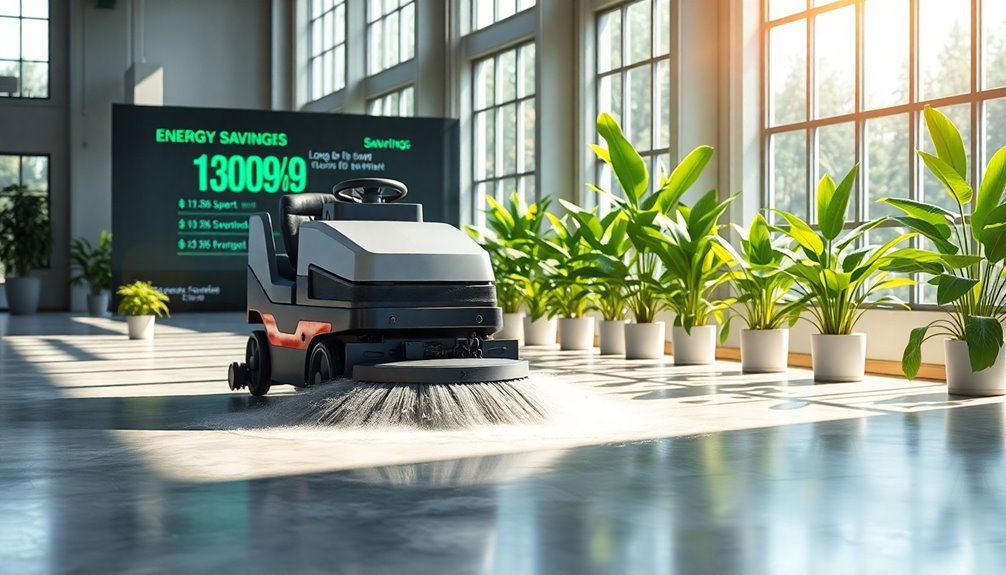
Investing in eco-friendly industrial sweeper machines may seem costly upfront, but the long-term savings they generate make them a smart choice for your business.
By considerably reducing energy and water consumption, you can lower operational expenses by up to 30%. The durable materials and advanced technologies in these machines decrease maintenance costs, as they require fewer repairs and replacements over time.
You'll also enjoy cost savings on cleaning supply expenditures since many eco-friendly models need minimal or no cleaning solutions, resulting in an estimated 20% reduction.
Plus, take advantage of tax incentives and rebates for using sustainable equipment, further offsetting your initial investment.
Contribution to Environmental Sustainability
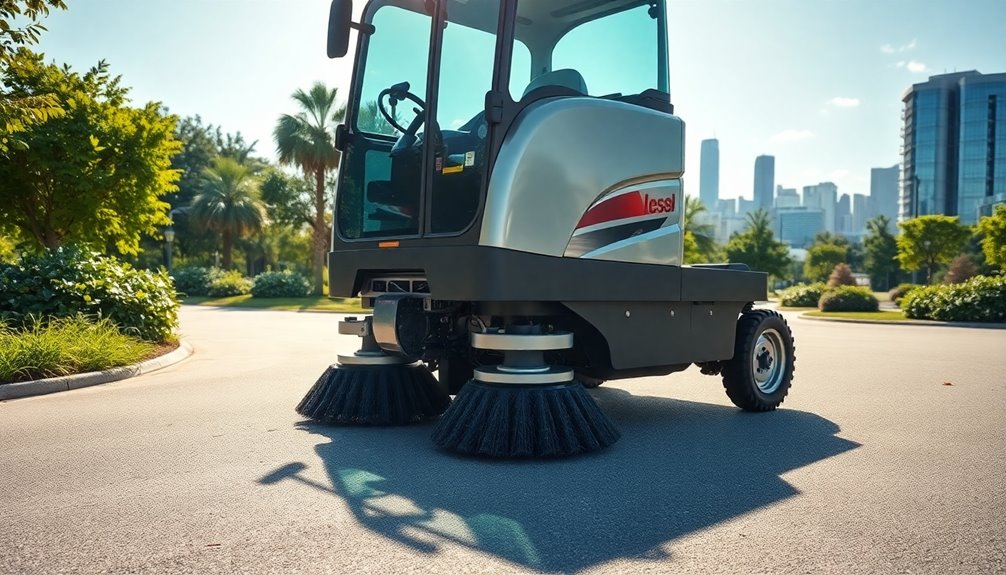
As businesses increasingly prioritize sustainability, industrial sweeper machines play an essential role in minimizing environmental impact.
By utilizing adjustable water flow settings, these machines greatly reduce water usage, making them sustainable choices in water-scarce areas. They often employ eco-friendly cleaning technologies, allowing you to clean effectively with minimal or no harmful chemicals, which reduces harmful runoff.
Advanced filtration systems enhance indoor air quality by capturing dust and allergens, promoting healthier workspaces. Energy-efficient designs lower the carbon footprint of operations, aligning with your corporate social responsibility (CSR) goals. Additionally, the integration of energy-efficient technology contributes to long-term operational savings.
Plus, their durability and recyclability minimize waste and support responsible disposal practices. Overall, industrial sweepers not only provide cleaner floors but also contribute to a greener planet.
Frequently Asked Questions
What Are the Industrial Impacts of Cleaner Production on the Environment?
Cleaner production greatly impacts the environment by reducing harmful pollutants released into air and water.
You'll notice improved air quality and healthier ecosystems as industries adopt eco-friendly practices.
By minimizing harsh chemicals, you lower the risk of soil and water contamination.
Energy-efficient machinery decreases energy consumption, cutting greenhouse gas emissions.
Plus, advanced cleaning technologies can save water, promoting conservation, which is essential in water-scarce areas.
How Do Vacuum Cleaners Affect the Environment?
Imagine a dragon breathing dust instead of fire. When you use traditional vacuum cleaners, they can stir up allergens and VOCs, turning your home into a hazardous lair.
They often guzzle energy, releasing carbon emissions that cloud the skies. Plus, their lifecycle creates landfill waste, as many materials aren't recyclable.
However, you can tame this dragon by choosing eco-friendly models with energy-efficient motors and advanced filters, making your cleaning ritual greener and healthier.
What Is the Environmental Impact of Cleaning Agents?
Cleaning agents can greatly impact the environment.
When you use traditional products, you're often releasing volatile organic compounds (VOCs) into the air, contributing to pollution and smog.
These harsh chemicals can contaminate waterways, harming aquatic life.
Improper disposal can lead to soil contamination, posing risks to both the ecosystem and human health.
What Is the Impact on the Environment of Cleaning Commercial Kitchens?
Did you know that traditional cleaning methods can release up to 50% more VOCs into the air?
When you clean commercial kitchens, the impact on the environment can be significant. Harsh chemicals contribute to air and water pollution, endangering both workers and ecosystems.
However, by using eco-friendly cleaning machines, you can minimize chemical use, conserve water, and improve indoor air quality, creating a safer space for staff while also protecting the planet.
Conclusion
In the grand tapestry of our planet's health, industrial sweeper machines weave threads of efficiency and sustainability. By cutting down on water and energy use, slashing harmful chemicals, and boosting indoor air quality, you're not just cleaning floors—you're nurturing a greener future. These machines don't just save you money; they're your allies in the fight for environmental preservation. So, as you sweep away the dirt, you're also sweeping in a revitalizing breeze for our planet.

